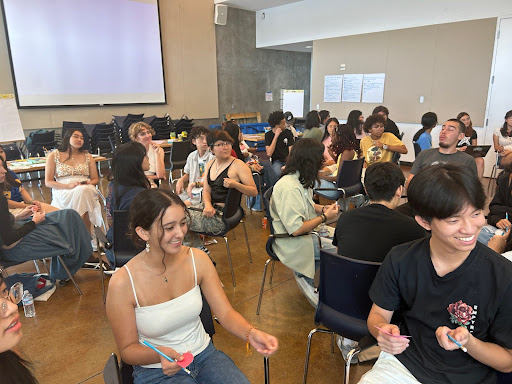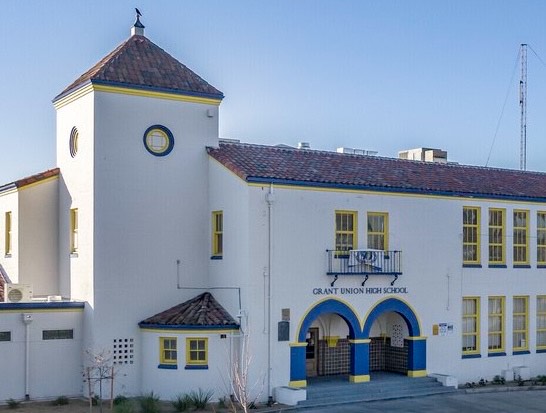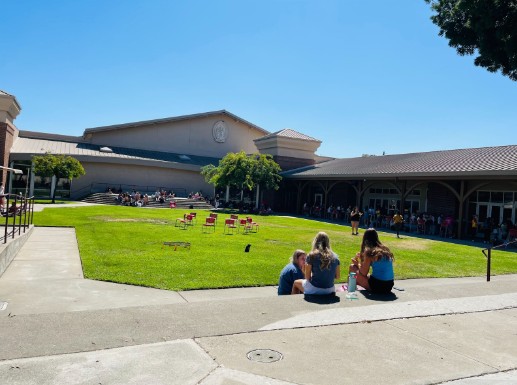By Rania Elguessab and Charynna Torres-Calderon Pe Benito
Sacramento high school students, social justice leaders and curious adults gathered at the Valley Hi-North Laguna Library in late July to participate in the “Abolition and Me: Stonewall’s Legacy” workshop.
The event, hosted by The Reclamation Project @ 916 (TRP@916), a 100% youth-run social justice organization, focused on advocating for prison reform both locally and nationally.
TRP@916 organized the workshop in collaboration with local organizations Decarcerate Sacramento, the Sacramento LGBT Community Center and Elevate Youth California. The educational programming highlighted issues of prison labor, abuses and neglect prevalent in the criminal justice system.
The workshop explored the historical mistreatment within the criminal justice system from the LGBTQ+ community’s perspective. Notably, the Stonewall Riots of June 1969, which were a response to a police raid at Stonewall Inn, a New York gay bar, which sparked the gay rights movement.
Attendees, including newly graduated high school students like *Ryann Elguessab, were introduced to the harsh realities of the prison system.
“Before the workshop, I didn’t fully understand why prison reform was such a big issue,” Elguessab said. “I thought it was just people complaining. But now I see how the system’s failures affect not just those incarcerated but the entire community. It’s eye-opening.”
A study reported by the National Institute of Justice found that around 1.7 to 2.7 million Americans experienced parental incarceration during their childhood. They refer to family members of incarcerated persons as “hidden victims”, as they receive little support.
Children of incarcerated persons are prone to mental illness, antisocial behavior, suspension or expulsion from school, economic hardship and criminal activity. Moreover, students who are heavily disciplined in schools are more likely to fall into the “School to Prison Pipeline”, described by workshop facilitators.
Celine Qin, founder of TRP@916, noted the widespread impact of the issues discussed.
“There were many youth in the audience whose parents and close family members are or were incarcerated and impacted by the system – and even if not their own personal family, they knew of impacted people … it was a very prevalent issue,” Qin said. “The matters that were presented in the workshop weren’t just thrown out of thin air. It was so meticulously curated and developed that it was something that resonated with everybody who was there.”
The core of the issues discussed was prison-related propositions in the California legislature. Notably, Proposition 6 aims to abolish prison labor in the state, while Proposition 36 would introduce stricter sentencing laws, increase punishment for drug and theft crimes and boost prison spending by tens of millions of dollars. Opponents of Proposition 36 argue that it would be ineffective in addressing the root issues that create repeat offenders.
Kari Hamilton, a workshop speaker from Decarcerate Sacramento, shared her personal experience of being incarcerated in a Sacramento prison to illustrate the system’s flaws. Decarcerate Sacramento opposes the rising jail expansions in the county and advocates for increased funding for community-based systems of care instead of policing and incarceration.
“When you come out of prison, you get $200 gate money, and $200 isn’t even enough for a night in a hotel,” Hamilton said. “The community is making a mistake by not providing resources properly. If someone is coming home on probation, they have even fewer resources than those on parole. It’s almost as if going to prison is better if you want access to rehabilitation services.”
A major point of discussion was the impact of societal factors such as poverty, racism and lack of access to essential services in the prison system. Hamilton mentioned that many underprivileged and homeless persons deliberately come in and out of Sacramento prisons for a place to stay.
“[Some] don’t have as much funding or maybe even education that has caused them to lack resources, [causing] them to need to steal, or break into places or feel that they need to do something that’s illegal and in order to even come in there for the winter,” Hamilton said. “There was one girl that… I saw every winter out of the three years I was there. And I’m like, What did you do this time? …She graffitied a bus with a pen, and that was her way to get out of the rain.”
Hamilton touched on how district attorneys and public offenders have incarcerated homeless pregnant women to shelter them, causing many to lose their children to the foster care system. Others end up having miscarriages, especially mothers with drug problems because Sacramento prisons do not administer Methadone, a medication that treats opioid addiction.
“Investing in community resources, like mental health services and education, can help break the cycle of incarceration,” Hamilton emphasized. “It’s crucial that we address these issues at their core to prevent individuals from entering the system in the first place.”
Decarcerate Sacramento advocates for increased funding of life-affirming human services that promote community safety, such as rehabilitation centers, community centers and social services agencies.
“We need to start small, like how we did in the workshop, and gradually build momentum,” Elguessab said. “By raising awareness and advocating for policy changes, we can work towards a fairer system.”
Qin credited Elevate Youth California for its support, which allowed TRP@916 to focus on analyzing the disproportionate impacts of the war on drugs on youth of color and LGBTQ+ communities.
“Systematically, we can talk about how there is health inequity embedded in this issue – there is the school-to-prison pipeline that ties into that resource inequity … substance abuse, mental health, social impact, life development, community … all those things that we see as interconnected,” Qin said. “We wanted an event that really spoke to that truth. It was relevant to what Sacramento is grappling with at the moment, and each organization provided its own perspective. For example, the LGBT center really wanted to embed the component of a queer LGBTQ+ revolutionary history.”
“Abolition and Me” advocated for systemic change in Sacramento and created a space for open community discussion, focusing on anti-carceral alternatives to address crime, such as increased mental health resources and rehabilitation support.
“It just made it all worth it to see young people who were genuinely passionate or really interested about the topic, or found a safe space in Abolition and Me,” Qin said. “(The fact) that they were able to express and articulate how their lived experiences have been shaped by the shortcomings of a prison and police-centered system, and how they were so willing to engage in our conversations and contribute… how their voices were important, and [on] how we’ll find solutions.”
Hamilton, like the rest of the leaders of Abolition and Me, is hopeful about the future of abolition and prison reform.
“It’s about creating a future where everyone has a fair chance, not just those who can afford it,” Hamilton said. “We need to build a society that supports all its members, rather than locking them away.”
About The Reclamation Project @ 916
TRP@916 prioritizes youth-led grassroots advocacy, fostering connections among Sacramento youth through outreach. Founded by Qin in 2020 in response to issues of resource and health inequity, discrimination and disparities in her school district, TRP@916 has evolved into a student activist-centered space addressing critical issues in California and beyond.
TRP@916 focuses on 3 core areas of activity: community-based resource development – addressing material needs through mutual aid events providing food to the unhoused and school supplies to children – youth mobilization – getting youth to volunteer, organize and serve on boards and commissions for policy advocacy– and liberating education, with events such as Abolition and Me.
“Liberating education involves creating public forums, dynamic workshops and discussions that engage young people with pressing issues they might not learn about in mainstream institutions, transforming them from passive receivers into proactive challengers of oppression,” Qin said.










S • Sep 6, 2024 at 6:33 pm
What a meaningful mission. Great work!
Sarah Gray • Sep 5, 2024 at 9:01 pm
So glad to see attenion being brought to this!